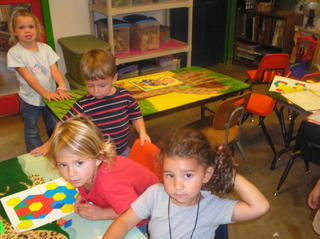 People have a strange notion of children. I got an email last night that blew me out of the water. Little kids hit each other. I thought everyone knew that. And depending on the care and love of good parents and providers, children begin to see that hitting is not the answer to their problems.
People have a strange notion of children. I got an email last night that blew me out of the water. Little kids hit each other. I thought everyone knew that. And depending on the care and love of good parents and providers, children begin to see that hitting is not the answer to their problems.As children become more verbal, they stop hitting, so the job of a good parent and a good provider is to teach children as much as they can, so that every child has alternatives.
Aggressive children come from too small an environment and too many children forced into a small environment and a shortage of goods and services. In a small crowded store with only one attendant long lines and few goods, wouldn't most adults freak out - especially if they were forced to stay there? But we expect to leave our most cherished little people in situations like that all the time. Here's an article:
Good news and bad news about day care
Thursday, October 20, 2005
BY PEGGY O'CROWLEY
Star-Ledger Staff
If you're following the debate over long-term effects of day care, take out your scorecards.
The National Institute of Child Health and Human Development's Study of Early Child Care, the largest and lengthiest look at children who spent their earliest years in daycare, has just released a report on how the subjects were doing at age 8. Born in 1991, the children are now 14 years old.
On the plus side, children who attended high-quality child care programs continued to perform better academically in language, math, and short-term memory tests through the third grade. And the much-hyped finding that 4-year-olds in day care were more aggressive and acted out more didn't seem to hold true by the time they reached third grade.
The bad news? While they may not be bullies, the children who spent early years in child care seemed to have poorer social skills and work habits when they got to third grade compared to peers who were not in child care.
The differences, however, were not that dramatic. What's more important, according to Carolyn Booth-LaForce, a principal investigator, is the quality of early parenting, which is two to three times more influential on how kids turn out than child care arrangements.
Depending on who's talking, the kids are all right, or they're in trouble.
"The argument is that it's a small effect, but the effects apply to lots of children. Are we creating a generation of children who have slightly poorer social skills and slightly poorer work habits? If you have a classroom full of these children, will teachers have to spend more time on social skills and behavior management than on academic subjects?" said Booth-LaForce, a professor at the University of Washington.
"We don't have the evidence to say whether that's happening, and I don't buy it. As of now, I'd be cautiously optimistic about these findings in terms of an individual child. Parents shouldn't be excessively worried about them," she said.
But Jay Belsky, another investigator now at the University of London, believes these effects are cause for concern. Belsky, an American scholar who has authored many studies on the ill effects of long hours spent in child care, believes the argument that the effects are small does not take into account that these effects are seen across large numbers of the study's 972 subjects.
"What is more important, large effects that apply to few, or small effects that apply to many? What happens when classrooms have lots of kids who spent lots of time in child care before entering school? Do teachers spend more time managing the class than teaching and do they end up teaching at a lower level?" Belsky asked, responding to questions sent via e-mail.
He also said the findings that 4-year-olds were not as aggressive at age 8 did not mean that later findings, such as less social competence and poorer academic work habits, should not be taken seriously.
"Consider a cold: Does the fact that you are no longer coughing mean all that much if you are now sneezing? If we were talking about the effects of maternal depression or growing up in poverty and we had exactly the same set of disappearing and emerging findings, would anybody be making these claims?" asked Belsky, the director of the Institute for the Study of Children, Families and Social Issues at the University of London.
So what's a parent to do?
Belsky likens himself to the weatherman forecasting the situation; what parents do with that information is up to them, he said. Booth-LaForce said the findings indicate that parents should pay attention to how they interact with their children, since their influence is greater than the effects of child care.
She also suggested that parents pay attention to the quality of their children's child care experiences, since quality is related to higher academic performance in later years.
The next milestone for the researchers, using the same 1,000-plus children in 10 locations across the country, will be an assessment of their skills and behaviors at the end of sixth grade. Those findings should be available in about two years, Booth-LaForce estimated. If funding holds out, they would like to keep evaluating the subjects until they reach young adulthood.
Peggy O'Crowley covers family issues. She can be reached at pocrowley@starledger.com or at (973) 392-5810.

No comments:
Post a Comment